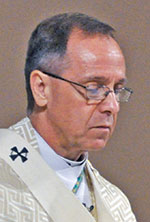The Good Steward
December 2018
Clericalism arises from an elitist and exclusivist vision of vocation that interprets the ministry received as a power to be exercised rather as a free and generous service to be given (Pope Francis).
The revelations of the past summer concerning the ways that many bishops failed to deal with the problem of clergy sexual abuse of children—and the accusations of abusive behavior against high ranking church officials themselves—have once again raised the problem of “clericalism.” It’s time to take this problem seriously.
Pope Francis tells us that clericalism is the mistaken view that the clergy have some form of exalted status in the Church that grants them special power or privileges. In reality, the pope says, bishops, priests and deacons are ordained for a special form of service, not an elitist sense of privilege.
Clergy fall into the trap of clericalism when they start to think of themselves as “set apart” from the rest of the Christian community in ways that have nothing to do with ordained ministry. Lay people display clericalist attitudes when they place bishops, priests and deacons on pedestals—expecting more of them than they can realistically be expected to give.
We expect our bishops, priests and deacons to be “holy, innocent, undefiled, separated from sinners and higher than the heavens” like Jesus (Hebrews 7: 23-28). And they are not. They are sinners like us who have answered the call to follow Jesus in a particular way—as men subject to weakness who humbly represent the one and only “high priest” who has been made perfect forever.
Only by the grace of God can they hope to live their vocation with integrity. Only by accepting and handing-over their weaknesses can they succeed in being Christ for others.
We call it “clericalism” when bishops, priests and deacons exalt themselves as a privileged class. But it is also clericalism when we expect them to be super-human, “high priests” whom we place on pedestals only to be scandalized by their human sinfulness.
Both forms of clericalism should be recognized as poisonous; both must be rooted out and destroyed if we wish to renew our Church.
Indianapolis Archbishop Emeritus Daniel M. Buechlein, O.S.B., now deceased, used to admonish people at ordinations and first Masses “not to be scandalized by the man in the priest.” He was reminding us that every priest (bishop or deacon) is a human being with faults and failings that are part of our sinful human condition. The grace of ordination assists the priest (bishop or deacon) on the path to holiness, but it does not guarantee anything like perfection. Like the rest of us, ordained clergy must lead a life of ongoing conversion. They must receive the sacraments with open hearts; they must meditate on God’s Word and pray without ceasing; and, perhaps most difficult of all, they must strive to practice what they preach so as to never appear to be “holier than thou.”
Archbishop Daniel also used to say that bishops, priests, deacons and all who exercise leadership in the Church must be held to the highest standards of morality and accountability. The moment we excuse the sins of the clergy as though they were somehow exempt from close scrutiny, we commit the grave sin of clericalism. At the same time, when we expect our bishops, priests, deacons and lay leaders in the Church to be perfect, we also commit a grave sin and we set ourselves up to be bitterly disappointed and angry.
Bitter experience has taught us that sexual abuse of children by adults is more than a moral failure. It is the result of deep-seated problems that can never be ignored (“swept under the carpet”) or successfully treated therapeutically. Had more bishops (and their counsellors and attorneys) recognized this reality, many innocent children might have been spared the horrors of clergy sexual abuse.
Let’s hope that same bitter experience has also taught us to regard bishops, priests, deacons and others in authority in our Church as the wounded healers and servant leaders they are called to be. Let’s not put anyone on a pedestal or give anyone a free pass when it comes to moral transparency and accountability.
We are all sinners in need of forgiveness. May the God of justice and mercy give us all the serenity, courage and wisdom to accept our human weaknesses even as we work together to change and grow as faithful disciples of the one and only High Priest, Jesus Christ.
Daniel Conway




 Statement by Indianapolis Archbishop Charles Thompson
Statement by Indianapolis Archbishop Charles Thompson
